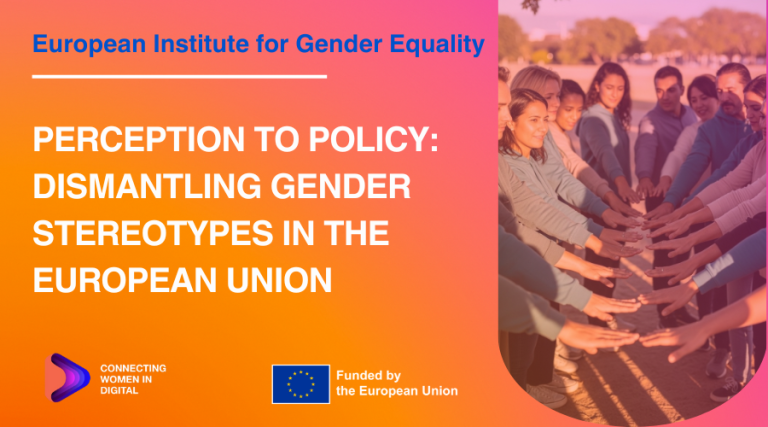Gender stereotypes remain one of the most persistent barriers to equality in Europe. They shape cultural norms, influence institutions and guide daily decisions, often limiting opportunities. The latest report from the European Institute for Gender Equality (EIGE), “Perception to policy: Dismantling gender stereotypes in the European Union”, shows how these narratives affect employment, education, leadership, health and even tolerance of violence.
The Gender Equality Index confirms that stereotypes act as hidden barriers to progress. In times of crisis, these attitudes often intensify, slowing or even reversing gains. Perceptions also diverge: women are more likely to recognise inequality at work, while young men tend to say that treatment is equal. This gap suggests that biases take root early and continue to shape adulthood.
Work and career progression
Across the EU, employment data highlight persistent differences. In 2024, 81% of men were employed compared with 71% of women. Women are also far more likely to work part-time (28% versus just 8% of men), often because they shoulder caregiving responsibilities.
Leadership positions remain unevenly distributed. Only 35% of managerial roles are held by women, while in technology the gap is even wider: women make up just 19% of ICT specialists. Stereotypes contribute to these imbalances. Women in leadership are often caught in a “double bind”: expected to be ambitious yet warm, assertive yet empathetic and frequently judged more harshly than men.
Attitudes reinforce these dynamics: among young people, 15% of men and 7% of women still think men should have priority for jobs when work is scarce. In some countries, agreement with this view has even grown, showing how traditional roles continue to influence perceptions of fairness and merit.
Financial independence and security
Stereotypes also affect economic autonomy. Many Europeans still see men as the main earners: 39% of women and 45% of men agree with this statement. Such beliefs contribute to structural inequalities that accumulate over time.
The numbers are telling. The gender pay gap stands at 12%, while the pension gap is more than double at 25%. Within couples, women earn on average just 70% of their partner’s income. These disparities limit women’s financial security and reinforce dependence, even though most Europeans support equal pay and financial independence.
Education: progress and persistent segregation
Education reflects both progress and paradox. Women have overtaken men in formal attainment: in 2024, half of women aged 30–34 had completed tertiary education, compared with 39% of men. Women are also less likely to leave school early (8% compared with 11% of men).
Stereotypes still guide choices: three out of four graduates in education, health and welfare are women, while two-thirds of STEM graduates are men. These patterns are reinforced by cultural cues: textbooks and teaching practices often associate women with caregiving and men with technical expertise. Girls, despite equal or stronger academic performance, often report lower confidence in subjects such as maths and science, influencing their future careers.
Care, housework and time use
At home, gender gaps remain striking. In 2024, 41% of women cared for children more than 35 hours a week, compared with 20% of men. When it comes to housework, 60% of women perform chores daily, compared with 34% of men.
Younger generations tend to support more equality in sharing responsibilities, but cultural divides remain sharp. In Spain, only 15% of young people think a woman’s main role is to care for the family, while in Hungary the figure rises dramatically to 78% of young men and 66% of young women. These contrasts show how strongly cultural norms continue to shape expectations.
Power and leadership
Leadership is still perceived through a masculine lens. Nearly half of Europeans believe men are more ambitious in politics, a sharp increase since 2017. In business women hold 34% of board seats but only 9% of chief executive roles in the largest companies.
Generational divides are particularly evident. One in three young men (33%) believe men make better leaders, compared with 15% of young women. A quarter of young men also consider women too emotional to lead. These attitudes reveal how early stereotypes about power and ambition take hold, limiting women’s opportunities to lead.
Health and well-being
Gender roles also shape health outcomes. Traditional ideals of masculinity encourage risky behaviours (such as heavy drinking, smoking or avoiding medical help) and discourage men from seeking support. This contributes to men being diagnosed with depression less often, even though they represent 77% of suicides in the EU.
Women, especially younger women, are more likely to notice bias in healthcare. Unequal treatment is particularly evident in reproductive and sexual health, where stigma and stereotypes remain obstacles to equal care.
Gender-based violence and coercive control
The report highlights troubling attitudes towards violence. One in three women in the EU has experienced physical or sexual violence in adulthood and 31% have faced harassment at work.
Equally concerning are young people’s views: 15% of young men think it is acceptable for a man to slap his partner, compared with 6% of young women. Almost 40% of young men say it is acceptable to monitor a partner’s digital activity. Harmful myths about consent also persist: 13% of young men believe that “no means yes,” compared with 7% of young women. These figures underline how stereotypes linking masculinity with control and dominance remain embedded, feeding cycles of abuse.
Pathways to change
EIGE points to several priorities:
- Work and leadership: diversify models of success and reform recruitment and promotion practices.
- Finance: ensure pay transparency and reframe financial competence as gender-neutral.
- Education: challenge stereotypes in curricula and highlight women role models in STEM.
- Care: promote equal, non-transferable parental leave and normalise male caregiving.
- Health: train professionals on gender sensitivity and support men’s mental health.
- Violence prevention: integrate consent education early and counter sexist norms.
Dismantling stereotypes requires more than awareness. It demands systemic change, policy innovation and cultural transformation.




